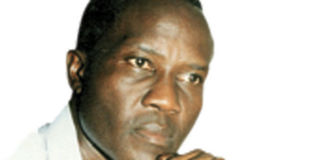Felix Kaweesi: The good, the friend, and the ugly

When Mr Peter Kibazo is hosting the Radio Simba programme, Gasimbagane ne Bannamawulire, he is virtually incapable of introducing into the discussion the name of anyone personally known to him without announcing that they are friends (“Oyo mukwano gwange”).
He probably believes that having so many ‘friends’ strengthens his credibility as a gatherer of information.
He makes a mistake. To the detached listener, the ‘friend’ instantly flashes the signal that you may not be impartial. You may deliberately distort in his or her favour.
The detached listener is not really interested in who is, or is not your friend. His interest is to know how the words or actions of this person are relevant to the issue under discussion, and you are putting him off by unduly declaring your ‘personal’ attachment.
But if an informal radio chat show can suffer when there is a perception that the participant(s) could be biased, the problem is more serious in institutions that deal directly with the enforcement of law and order and the delivery of justice.
In the wake of AIGP Andrew Felix Kaweesi’s death, words like ‘friendly’, ‘approachable’ and ‘amiable’ have been circulated with such abandon that the fallen police officer’s ‘social’ image has virtually eclipsed his professional contribution to the Force.
It seems that almost everyone who is anyone had interacted with Kaweesi.
He was a good man; maybe, but did this goodness advance the cause of the Force?
One of the stories that have been circulating is that he took Kampala’s tycoons, the ‘Bagagga Kwagalana’ fraternity, to his (Roman Catholic) parish to raise funds for a church building.
If a junior police officer had pulled off this coup, perhaps it should not worry many people; but Kaweesi was No.3 in the Force.
In this corrupt country, where great wealth and high office are generally associated with influence peddling and impunity, would good Kaweesi after that fundraiser be able to withstand any pressure and deal professionally with a tycoon entangled in serious wrongdoing?
It is an irony; a seemingly good gesture for the local church potentially contributing to decay at the highest level in the police Force.
Then there was Kaweesi’s politics, which seems to have been an exercise in the invention of shadows.
On Radio Simba’s Gasimbagane ne Bannamawulire, March 18, Opposition MP Muwanga Kivumbi revealed that Kaweesi had whispered to him that he was fed up with police work (“bintamye”), and he was thinking of standing for Parliament.
With other friends of Kaweesi giving similar accounts, it seems the ‘secret’ was only covered below the ankles.
Since the death, stories have come out that he brought electricity to his area in Lwengo. (Lobbying or influence-peddling? Some people ask.)
And he is said to have constructed a road. (How did he get the money? His salary was probably below Shs5 million.)
These seemingly good works are neither the responsibility of a prospective parliamentary candidate, nor the tasks of a serving police officer.
It is the ugliness of Uganda’s politics and governance that makes them look normal and even praiseworthy.
Kaweesi confided in Opposition politicians, but he would very likely stand as an NRM or ‘Independent’ candidate.
In Uganda’s grotesque politics, where it verges on treason for a senior security official to belong to the Opposition, spineless hypocrisy and duplicity are often glossed over as marks of an ‘accommodating’, or ‘balanced’, ‘or non-partisan’, or ‘strategic’ operator.
But how can uncommitted expediency be accountable?
We are then left with Kaweesi, who cannot be distanced from the Force he served as AIGP.
I hear many voices saying that it is not a glorious Force, that it is a brutal tool of the ruling party. And if Kaweesi was genuinely fed up with it, then No. 3 was probably no longer motivated to improve it or go up in rank, focusing instead on the lucrative MP seat four years away!
Did he have any radically innovative ideas to take to Parliament?
If not, then even a brazen NRM must admit that it is time to revisit the hopelessness in the country’s institutions.
Mr Tacca is a novelist, socio-political commentator.




